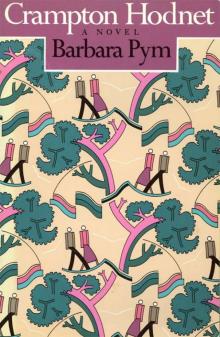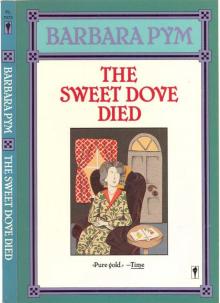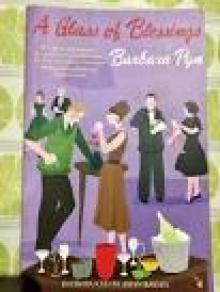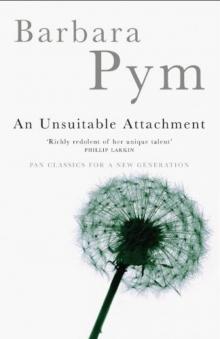- Home
- Barbara Pym
Quartet in Autumn
Quartet in Autumn Read online
Barbara Pym
Quartet in Autumn
First published 1977 by Macmillan London Ltd
This edition published 2004 by Pan Books an imprint of Pan Macmillan Led Pan Macmillan, 20 New Wharf Road. London NI 9RR Basingstoke and Oxford Associated companies throughout the world
ISBN 0 330 32648 I
Copyright © Hazel Holt 1977
A QP catalogue record for this book is available from the British Library.
One
Two
Three
Four
Five
Six
Seven
Eight
Nine
Ten
Eleven
Twelve
Thirteen
Fourteen
Fifteen
Sixteen
Seventeen
Eighteen
Nineteen
Twenty
Twenty-one
Twenty-two
Twenty three
Twenty-Four
One
THAT DAY THE four of them went to the library, though at different times. The library assistant, if he had noticed them at all, would have seen them as people who belonged together in some way. They each in turn noticed him; with his shoulder-length golden hair. Their disparaging comments on its length, its luxuriance, its general unsuitability—given the job and the circumstances—were no doubt reflections on the shortcomings of their own hair. Edwin wore his, which was thin, greying and bald on top, in a sort of bob—‘even older gentlemen are wearing it longer now’, his barber had told him—and the style was an easy one which Edwin considered not unbecoming to a man in his early sixties. Norman, on the other hand, had always had ‘difficult’ hair, coarse, bristly and now iron-grey, which in his younger days had refused to lie down flat at the crown and round the parting. Now he did not have to part it and had adopted a medieval or pudding-basin style, rather like the American crew-cut of the forties and fifties. The two women—Letty and Marcia—had hair as different from each other as it was possible to imagine in the nineteen seventies, when most women in their sixties had a regular appointment at the hairdresser for the arrangement of their short white, grey or dyed red curls. Letty had faded light brown hair, worn rather too long and in quality as soft and wispy as Edwin’s was. People sometimes said—though less often now—how lucky she was not to have gone grey, but Letty knew that there were white hairs interspersed with the brown and that most people would have had a brightening ‘rinse’ anyway. Marcia’s short, stiff, lifeless hair was uncompromisingly dyed a harsh dark brown from a bottle in the bathroom cupboard, which she had used ever since she had noticed the first white hairs some thirty years earlier. If there were now softer and more becoming ways of colouring one’s hair, Marcia was unaware of them.
Now, at lunchtime, each went about his or her separate business in the library. Edwin made use of Crockford’s Clerical Directory and also had occasion to consult Who’s Who and even Who Was Who, for he was engaged in serious research into the antecedents and qualifications of a certain clergyman who had recently been appointed to a living in a parish he sometimes frequented. Norman had not come to the library for any literary purpose, for he was not much of a reader, but it was a good place to sit and a bit nearer than the British Museum which was another of his lunchtime stamping grounds. Marcia too regarded the library as a good, free, warm place not too far from the office, where you could sit for a change of scene in winter. It was also possible to collect leaflets and pamphlets setting out various services available for the elderly in the Borough of Camden. Now that she was in her sixties Marcia took every opportunity to find out what was due to her in the way of free bus travel, reduced and cheap meals, hairdressing and chiropody, although she never made use of the information. The library was also a good place to dispose of unwanted objects which could not in her opinion be classified as rubbish suitable for the dustbin. These included bottles of a certain kind, but not milk bottles which she kept in a shed in her garden, certain boxes and paper bags and various other unclassified articles which could be left in a comer of the library when nobody was looking. One of the library assistants (a woman) had her eye on Marcia, but she was unconscious of this as she deposited a small, battered tartan-patterned cardboard box, which had contained ‘Killikrankie oatcakes’, at the back of a convenient space on one of the fiction shelves.
Of the four only Letty used the library for her own pleasure and possible edification. She had always been an unashamed reader of novels, but if she hoped to find one which reflected her own sort of life she had come to realize that the position of an unmarried, unattached, ageing woman is of no interest whatever to the writer of modern fiction. Gone were the days when she had hopefully filled in her Boots Book Lovers’ library list from novels reviewed in the Sunday papers, and there had now been a change in her reading habits. Unable to find what she needed in ‘romantic’ novels, Letty had turned to biographies of which there was no dearth. And because these were ‘true’ they were really better than fiction. Not perhaps better than Jane Austen or Tolstoy, which she had not read anyway, but certainly more ‘worth while’ than the works of any modern novelist.
In the same way, Letty, perhaps because she was the only one of the four who really liked reading, was also the only one who regularly had lunch out of the office. The restaurant she usually patronized was called the Rendezvous but it was not much of a place for romantic meetings. People who worked in the nearby offices crowded in between twelve and two, ate their meal as quickly as possible, and then hurried away. The man at Letty’s table had been there when she sat down. With a brief hostile glance he handed her the menu, then his coffee had come, he had drunk it, left 5p for the waitress and gone. His place was taken by a woman who began to study the menu carefully. She looked up, perhaps about to venture a comment on price increases, pale, bluish eyes troubled about VAT. Then, discouraged by Letty’s lack of response, she lowered her glance, decided on macaroni au gratin with chips and a glass of water. The moment had passed.
Letty picked up her bill and got up from the table. For all her apparent indifference she was not unaware of the situation. Somebody had reached out towards her. They could have spoken and a link might have been forged between two solitary people. But the other woman, satisfying her first pangs of hunger, was now bent rather low over her macaroni au gratin. It was too late for any kind of gesture. Once again Letty had failed to make contact.
Back in the office Edwin, who had a sweet tooth, bit the head off a black jelly baby. There was nothing racist about his action or his choice, it was simply that he preferred the pungent liquorice flavour of the black babies to the more insipid orange, lemon or raspberry of the others. The devouring of the jelly baby formed the last course of his midday meal which he usually ate at his desk among papers and index cards.
When Letty came into the room he offered her the bag of jelly babies but this was only a ritual gesture and he knew that she would refuse. Eating sweets was self-indulgent, and even though she was now in her sixties there was no reason why she should not keep her spare, trim figure.
The other occupants of the room, Norman and Marcia, were also eating their lunch. Norman had a chicken leg and Marcia an untidy sandwich, bulging with lettuce leaves and slippery slices of tomato. On a mat on the floor the electric kettle was pouring out steam. Somebody had put it on for a hot drink and forgotten to switch it off.
Norman wrapped up his bone and placed it neatly in the wastepaper basket. Edwin lowered an Earl Grey tea bag carefully into a mug and filled it with boiling water from the kettle. Then he added a slice of lemon from a small round plastic container.
Marcia opened a tin of instant coffee and made two mugs of the d
rink for herself and Norman. There was nothing particularly significant about her action—it was just a convenient arrangement they had. They both liked coffee and it was cheaper to buy a large tin and share it between them. Letty, having had her meal out, did not make herself a drink, but went into the cloakroom and fetched a glass of water which she placed on a coloured hand-worked raffia mat on her table. Her place was by the window and she had covered the window sill with pots of trailing plants, the kind that proliferated themselves by throwing out miniature replicas which could be rooted to make new plants. ‘Nature she loved, and next to Nature, Art.’ Edwin had once quoted, even going on to finish the lines about her having warmed both hands before the fire of life—but not too close, mind you. Now the fire was sinking, as it was for all of them, but was she, or were any of them, ready to depart?
Something of this may have been in Norman’s subconscious as he turned the pages of his newspaper.
‘Hypothermia,’ he read the word slowly. ‘Another old person found dead. We want to be careful we don’t get hypothermia.’
‘It isn’t a thing you get,’ said Marcia bossily. ‘Not like catching an infectious disease.’
‘Well, if you were found dead of it, like this old woman here, you could say you’d got it, couldn’t you?’ said Norman, defending his usage.
Letty’s hand moved over to the radiator and lingered there. ‘It’s a state or condition, isn’t it,’ she said, ‘when the body gets cold, loses heat or something like that.’
‘That’s one thing we’ve got in common then,’ said Norman, his snappy little voice matching his small spare body. ‘The chance of being found dead of hypothermia.’
Marcia smiled and fingered a leaflet in her handbag, one she had picked up at the library that morning—something about extra heating allowances for the elderly—but she kept the information to herself.
‘Cheerful, aren’t you,’ said Edwin, ‘but perhaps there’s something in it. Four people on the verge of retirement, each one of us living alone, and without any close relative near—that’s us.’
Letty made a murmuring sound, as if unwilling to accept this classification. And yet it was undeniably true—each one lived alone. Strangely enough they had been talking about it earlier that morning when something—again in Norman’s paper—had reminded them that Mother’s Day was upon them, with the shops full of suitable gifts and the price of flowers suddenly going up. Not that they ever bought flowers, but the increase was noted and commented on. Yet it could hardly affect people too old to have a mother still alive. Indeed, it was sometimes strange to reflect that each of them had once had a mother. Edwin’s mother had lived to a respectable age—seventy-five—and had died after a brief illness without giving any trouble to her son. Marcia’s mother had died in the suburban house where Marcia now lived alone, in the upstairs front bedroom with the old cat Snowy beside her. She had been eighty-nine, what some might think of as a great age but nothing wonderful or to be remarked on. Letty’s mother had died at the end of the war, then her father had married again. Shortly after this her father had died and the stepmother had in due course found another husband, so that Letty now had no connection with the West Country town where she had been born and brought up. She had sentimental and not entirely accurate memories of her mother, wandering round the garden snipping off dead heads, wearing a dress of some floating material. Only Norman had never known his mother—‘Never had a mum,’ he used to say in his bitter sardonic way. He and his sister had been brought up by an aunt, and yet it was he who inveighed most fiercely against the commercializing of what had originally been the old country custom of Mothering Sunday.
‘Of course you’ve got your church,’ said Norman, addressing Edwin.
‘And there’s Father Gellibrand,’ said Marcia, for they had all heard so much about Father G., as Edwin called him, and they envied Edwin the stable background of the church near Clapham Common where he was Master of Ceremonies (whatever that might be) and on the parochial church council (the PCC). Edwin would be all right, because although he was a widower and lived alone he had a married daughter living in Beckenham, and no doubt she would see to it that her old father wasn’t found dead of hypothermia.
‘Oh, yes, Father G.’s a real tower of strength,’ Edwin agreed, but after all the church was open to everybody. He couldn’t understand why neither Letty nor Marcia seemed to go to church. It was easier to see why Norman didn’t.
The door opened and a young black girl, provocative, cheeky and bursting with health, entered the room.
‘Anything for the post?’ she asked.
The four were conscious of the way she looked at them, perhaps seeing Edwin, large and bald with a pinkish face, Norman, small and wiry with his bristly grey hair, Marcia with her general look of oddness, Letty, fluffy and faded, a Home Counties type, still making an effort with her clothes.
‘Post?’ Edwin was the first to speak, echoing her question. ‘Hardly yet, Eulalia. The post does not have to be collected until half past three, and it is now’—he consulted his watch—‘two forty-two precisely. Just trying it on,’ he said, when the girl retired, defeated.
‘Hoping to get off early, lazy little so-and-so,’ said Norman.
Marcia closed her eyes wearily as Norman began to go on about ‘the blacks’. Letty tried to change the subject, for it made her uneasy to criticize Eulalia or to be guilty of any unkindness towards coloured people. Yet the girl was irritating and needed to be disciplined, even though there was no doubt that her exuberant vitality was disturbing, especially to an elderly woman who felt herself in contrast to be greyer than ever, crushed and dried up by the weak British sun.
Tea came at last and just before five o’clock the two men packed up what they were doing and went out of the room together, though they would separate on leaving the building, Edwin to the Northern Line for Clapham Common and Norman to the Bakerloo for Kilburn Park.
Letty and Marcia began a more leisurely tidying up. They did not speak of or break into gossip about the two men, who were accepted as part of the office furniture and not considered worthy of comment unless they did something surprisingly out of character. Outside, the pigeons on the roof were picking at each other, presumably removing insects. Perhaps this is all that we as human beings can do for each other, Letty thought. It was common knowledge that Marcia had recently had a serious operation. She was not a whole woman; some vital part of her had been taken away, though whether womb or breast was not generally known, Marcia herself revealing only that she had undergone ‘major surgery’. But Letty did know that Marcia had had a breast removed, though even she did not know which one. Edwin and Norman had speculated on the matter and discussed it in the way men did; they felt that Marcia ought to have told them about it, seeing that they all worked together so closely. They could only conclude that the operation had made her even more peculiar than she had been already.
In the past both Letty and Marcia might have loved and been loved, but now the feeling that should have been directed towards husband, lover, child or even grandchild, had no natural outlet; no cat, dog, no bird, even, shared their lives and neither Edwin nor Norman had inspired love. Marcia had once had a cat but old Snowy had long since died, ‘passed on’ or ‘been taken’, however one liked to put it. In such circumstances women may feel a certain unsentimental tenderness towards each other, expressed in small gestures of solicitude, not unlike the pigeons picking insects off each other. Marcia, if she felt the need for such an outlet, was incapable of putting it into words. It was Letty who said, ‘You look tired—shall I make you a cup of tea?’ And when Marcia refused the offer, she went on, ‘I hope your train won’t be too crowded, that you’ll get a seat—it should be better now, getting on for six o’clock.’ She tried to smile at her, but when she looked at Marcia she saw that her dark eyes were alarmingly magnified behind her glasses, like the eyes of some nocturnal tree-climbing animal. A lemur or a potto, was it? Marcia, glancing sharply at Letty, thought,
she’s like an old sheep, but she means well even if she seems a bit interfering at times.
Norman, speeding northwards on the Stanmore branch of the Bakerloo line, was going to visit his brother-in-law in hospital. Now that his sister was dead there was no direct link between him and Ken, and Norman felt pleasantly virtuous at going to see him. He has no one, he thought, for the only child of the marriage had emigrated to New Zealand. In fact Ken did have somebody, a woman friend whom he expected to marry, but she did not visit on the same day as Norman. ‘Let him come on his own,’ they had said to each other, ‘for after all he has no one and the visit will be a bit of company for him.’
Norman had never been in hospital himself but Marcia had dropped many hints about her experiences and especially about Mr Strong, the surgeon who had cut her up. Not that Ken’s experience could be compared with hers but it gave one an idea. Norman was ready to surge through the swing doors with the crowd into the ward when the signal was given. He had not brought flowers or fruit, it being understood between them that the visit was all that was expected or required. Ken was not much of a one for reading either, though he was quite glad to glance at Norman’s Evening Standard By profession he was a driving examiner and his present stay in hospital was the result, not of an accident with a middle-aged woman driver on test, as was jokingly assumed in the ward, but of a duodenal ulcer brought about by the worrying nature of life in general, to which the anxieties of his job must surely have contributed.
Norman sat down by the side of the bed, averting his eyes from the other patients. Ken seemed a bit low, he thought, but men did not look their best in bed. There was something very unattractive about the average man’s pyjamas. The ladies made more of an effort with their pastel-coloured nighties and frilly bed jackets which Norman had caught glimpses of when he passed the women’s medical ward on his way up. Ken’s bedside table held only a box of paper handkerchiefs and a bottle of Lucozade beside the regulation plastic water jug and glass, but in the recess underneath Norman could see a metal bowl for vomiting and a curiously shaped ‘vase’ of a grey, cardboard-like material which he suspected was something to do with passing urine—waterworks, as he put it The sight of these half-concealed objects made him feel uneasy and resentful, so that he didn’t quite know what to say to his brother-in-law.

 Crampton Hodnet
Crampton Hodnet Quartet in Autumn
Quartet in Autumn No Fond Return of Love
No Fond Return of Love The Sweet Dove Died
The Sweet Dove Died Excellent Women
Excellent Women A Very Private Eye: The Diaries, Letters and Notebooks of Barbara Pym
A Very Private Eye: The Diaries, Letters and Notebooks of Barbara Pym Jane and Prudence
Jane and Prudence A Glass of Blessings
A Glass of Blessings Civil to Strangers and Other Writings
Civil to Strangers and Other Writings An Unsuitable Attachment
An Unsuitable Attachment Less Than Angels
Less Than Angels A Few Green Leaves
A Few Green Leaves Civil to Strangers
Civil to Strangers